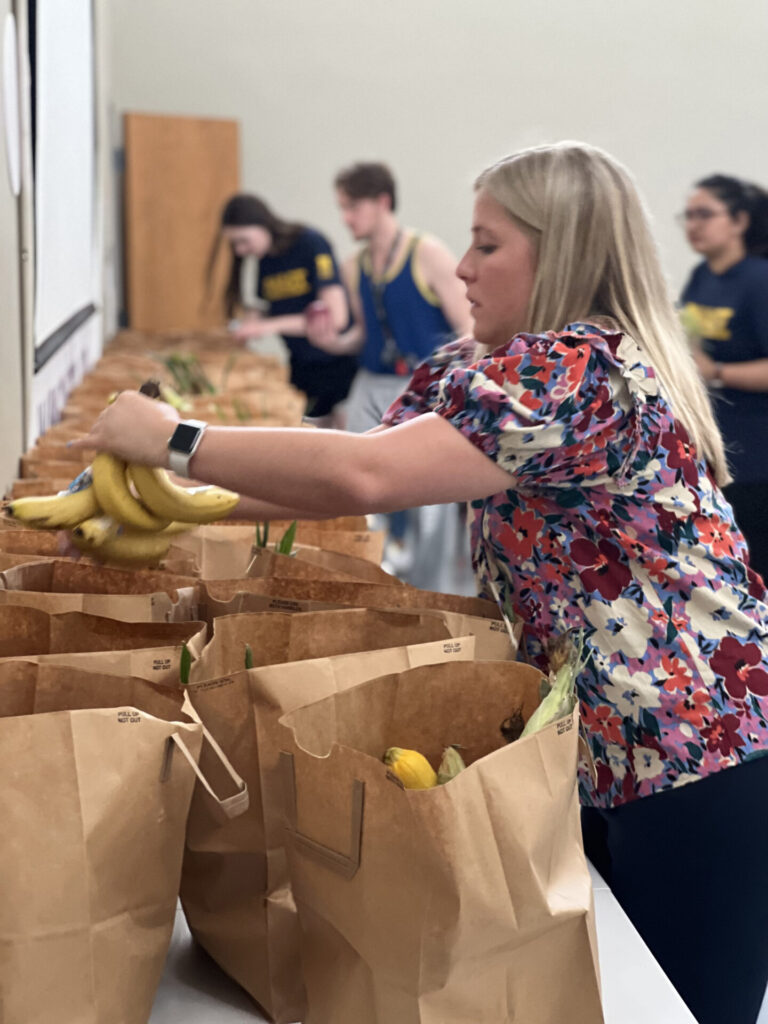By Edwin B. Smith
University

Nutritionally-vulnerable Quitman County households soon will have access to valuable food supplies, thanks to a University of Mississippi program funded by the U.S. Department of Agriculture.
The USDA’s Gus Schumacher Nutrition Incentive Program has awarded a $500,000 grant to the UM Community First Research Center for Wellbeing and Creative Achievement, known as UM CREW, to expand a food prescription program created in 2020 in Charleston.
“This is incredibly exciting, given the emergence of food prescription programs as a go-to mechanism for addressing food and nutrition security, despite very little biometric evidence,” said Anne Cafer director of the Center for Population Studies and co-director of UM CREW.
UM CREW will enroll 35 households, which will receive money to purchase produce at their local grocery store for the next three years. During that period, the research team will make quarterly visits to collect data on the participants’ overall health, including their height, weight, body mass index, waist size and blood sugar levels.
“We will look for both practically and clinically significant reductions in these measures, except for height,” Cafer said. “This provides a larger body of evidence for which to advocate for coverage of fruit and vegetable prescription by insurance agencies.”
The program is partnership between UM CREW and the James C. Kennedy Wellness Center with support from the Kroger, Anthem Insurance, the Quitman County School District and the Aaron E. Henry school-based clinic.
“This is a holistic program,” Cafer said. “Patients are referred to the program by health care providers and receive a ‘prescription’ for more fruits and vegetables. This prescription is filled by the patient at the local grocery store.
“This provides some support and education while also maximizing patient autonomy. While this is designed to improve access, it is also about approaching health holistically from a nutrition wellness standpoint.”
Cafer led the implementation of UM CREW’s first food prescription program along with Meagan Rosenthal, interim director of the William Magee Institute for Student Wellbeing, co-director of UM CREW, and associate professor of pharmacy administration.
The team has since expanded, adding Victoria Zigmont, assistant professor of health, exercise science and recreation management, and Georgianna Mann, associate professor of nutrition and hospitality management, to help broaden the scope of the study.
Their role is to help facilitate the program and to document outcomes and programmatic changes needed by the community. This is a community-based program that was designed in collaboration with the community.
“My hope is that the results of our work will prove beneficial for generations to come,” Zigmont said.
The research team is partnering with the stakeholders in Quitman County, including the local government, school district and industry partners, to discuss ways to enhance the program’s sustainability. Additionally, Rosenthal will garner feedback from participants that will be used to guide the future of UM CREW’s food prescription program.
“As an implementation scientist, my expertise in making sure that patient and community needs are reflected in the evaluation and programming are critical to the long-term success of the project,” Rosenthal said.
A key component of the program is nutritional health education. The team has partnered with the school district to create health and nutrition educational programming and resources to share in its classrooms, in the community and with participating households.
“We plan to discuss what the school needs are currently, and how we can help promote healthy eating in schools,” Mann said. “We hope to closely tie the nutrition education in schools to the nutrition education in the food Rx program and in the store.
“I hope that these components can empower community members by building their confidence with new foods and nutrition knowledge to create a more well-rounded diet.”
The project also provides the researchers with proof of concepts for how to build, implement, adjust and sustain these types of programs in rural spaces, Cafer said. Historically, these programs have been implemented only in urban spaces.
This initiative will add to the sparse literature on the impact of food prescription programs on household well-being.
While it is still too early for broad implementation of food prescription programs, the concept has a huge potential to address communities with food insecurity and poor health environments, Cafer said.
“In the short-term, food insecurity will be reduced, we expect to see improvements in health metrics, improvements in nutrition knowledge and self-efficacy in making decisions around nutrition for the family,” she said.
“Long-term, we hope to see systemic changes in the health care systems, including increased access to nutrition education and well-being education, improved coverage of the types of foods that improve health for nutritionally vulnerable patients, and community change that supports robust local partnerships around food and health.”
This work is supported by the USDA National Institute of Food and Agriculture.

Recent Comments